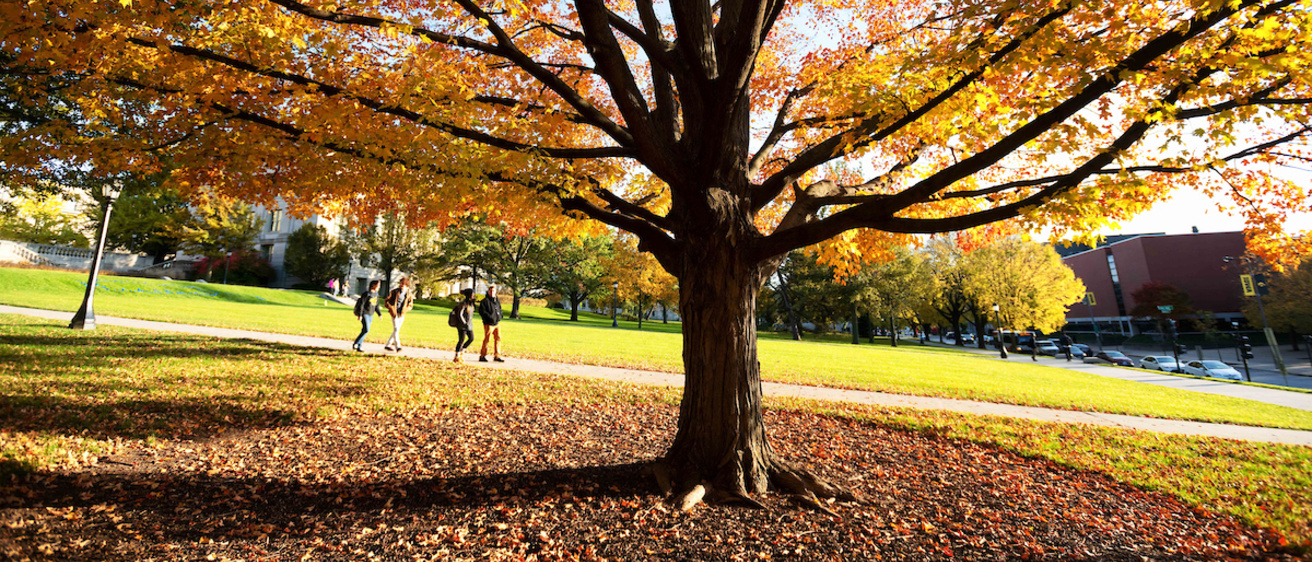Still deciding on a major? Apply to the College of Liberal Arts and Sciences as an open major and work closely with an advisor to select a program that fits your interests.
You’re ready to enroll in college and all is well, except you have no idea what you’d like to study as a major or choose as a career.
At the University of Iowa, that’s not a problem. About 20 percent of new students entering the university each year haven’t made a final choice about their major or their career. These students usually enroll in the College of Liberal Arts and Sciences, declaring an open major. They plan to choose a major after taking courses in the General Education Core Program or elective courses in fields of possible interest.
If you are interested in engineering but not sure which field you want to pursue, it also is possible to apply to the College of Engineering as an undeclared major.
Iowa offers more than 200 areas of study (including majors, minors, and certificate programs) to consider. Sorting through them can be a challenging process, so our goal is to provide a wealth of information and resources to help you review your options, explore the areas that interest you, and help you make the best choices for your future.
Resources include our Academic Advising Center, the Pomerantz Career Center, our internships and externships programs, and undergraduate research opportunities you don't find at every university.
Iowa students who declare an open major are assigned an advisor at the Academic Advising Center. Your advisor can:
- Answer questions about areas of study
- Provide information about majors’ specific application requirements
- Work with you to identify academic and vocational interests
- Assist you in course selection to explore possible majors
- Help you discover experiences outside the classroom that can further define your interests
- Introduce you to other resources that can be helpful to your decision-making process
You might not immediately declare a particular major because you want to explore your interests before declaring a major. Your advisor can help you choose courses that will keep your options open, especially if you are considering a limited-admission major that requires prerequisite courses.
Other resources that can help you narrow your choices include the first steps for open majors on the Academic Advising Center website. It explains many things you can do that will help you choose a major.
If you have not decided on an area of study, you need to meet the requirements for admission to the College of Liberal Arts and Sciences.
If you are interested in an engineering major, you must meet the requirements for admission to the College of Engineering.
Information
The process of learning about career options often begins at our Pomerantz Career Center. Many liberal arts and sciences graduates end up in careers quite different from their major area. However, working with our career center's staff can help you clarify your direction, and that will help you choose a career and major.
At the Career Center, students are encouraged to stop in and take online interest inventories, meet with a career advisor, and learn about possible internships and full-time positions in an online recruiting system. The center hosts multiple career fairs, thousands of interviews, and other events each year. Students also can enroll in one of several career courses including Career Exploration and the Career Leadership Academy, a program designed to help students develop leadership and employee-readiness skills.
To learn about jobs that might interest you, explore the Occupational Outlook Handbook, a nationally recognized source of career information provided by the Bureau of Labor Statistics. It describes what workers do on the job, working conditions, training and education needed, earnings, and expected job prospects in a wide range of occupations.
Internships/Externships
One of the best ways to gain firsthand knowledge of career fields is through internships or externships, which can be arranged with assistance from the Pomerantz Career Center and some academic departments.
Internships are short-term work experiences (usually ranging from a few weeks up to a year) that are in some way related to your area of study or career path. They can be full-time or part-time, paid or unpaid, and sometimes may earn you academic credit. They are valuable opportunities to apply what’s learned in class to a supervised work situation and allow you to prove your abilities in a professional situation.
Many employers stress the importance of having quality internships on one’s résumé. The Pomerantz Career Center sponsors several unique experiences such as the Des Moines Center, Walt Disney College Program, Experience Iowa, and the Washington Center internship programs.
Iowa students recently have participated in internships with Newsweek magazine, Viacom/MTV Networks, Collins Aerospace, the U.S. government, Wells Fargo Financial, John Deere, Walt Disney World, Merrill Lynch, and the American Council of Young Political Leaders.
Job shadowing the president of a Midwestern television station, a neurosurgeon in New York City, or an Intel marketing manager in California are all examples of externships. They provide on-the-job experience, often during winter or spring breaks.
The Career Center offers these types of opportunities for students to interact with successful Iowa graduates through a career exploration program called ICE-Net, a collection of more than 500 Iowa alumni who have volunteered to help students with career networking.
Iowa offers more than 500 student organizations. Joining a student organization, whether academic or recreational in nature, can provide ways to learn more about majors and careers. So can volunteering with university and community service agencies and organizations.
Opportunities to Explore
The university offers an "Exploring Majors Fair" each fall semester for first-year students who want to explore the wide array of academic options at Iowa.
Undergraduate Research Programs
The University of Iowa is classified as an RU/VH Research University, meaning its professors are on the cutting edge of research in their fields.
Whether the area is biology, geology, psychology, medicine, engineering, business, or another area of the arts or sciences, getting involved in research as an undergraduate can be great preparation for a career. It also can help students who have not declared a major to decide whether a particular field is appropriate for them. Students at Iowa have remarkable opportunities in this area. Not all colleges and universities offer research opportunities to undergraduates.
Students who are active in research as undergraduates are more likely to be accepted into a graduate or professional program. Also, research involvement can provide credit hours toward graduation, money for education, and important letters of recommendation.
Many campus programs support students interested in academic and scientific research, including the University of Iowa Honors Program, the Iowa Center for Research by Undergraduates Program, and the Iowa Biosciences Advantage Program (for underrepresented minority students).
The University of Iowa provides a variety of scholarships to eligible undergraduate students through the Iowa Scholarship Portal. Scholarships are available to first-year, transfer, and currently enrolled students. For additional details on scholarships for your program of study, check directly with the department or college.
The Office of Admissions and the Office of Student Financial Aid are great resources for students seeking scholarships.
If you are interested in Iowa’s Four-Year Graduation Plan, you’ll need to work closely with your advisor. Most majors at Iowa are eligible for the four-year plan and have course requirement checkpoints that must be met in each of the four years. You may be able to graduate in four years even if you don’t choose your major by the end of your first year, but you’ll need to plan carefully.



